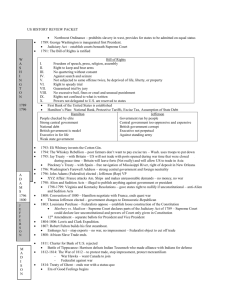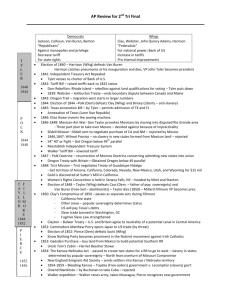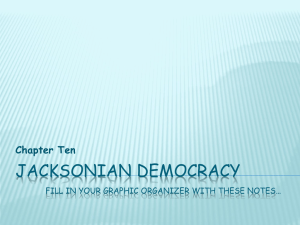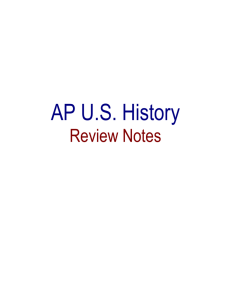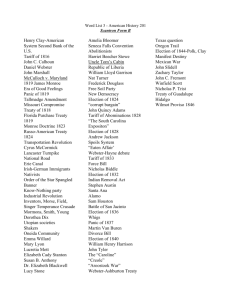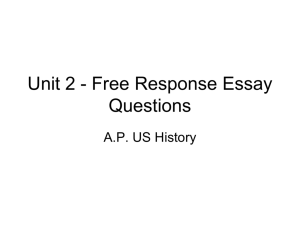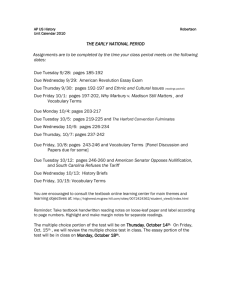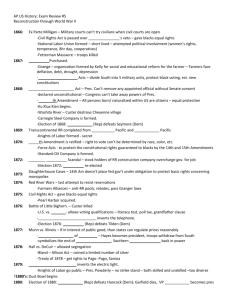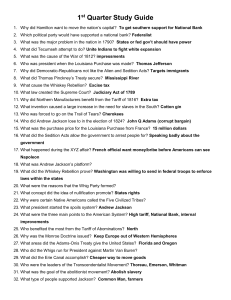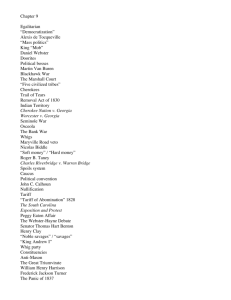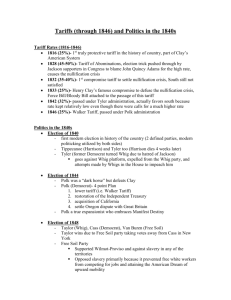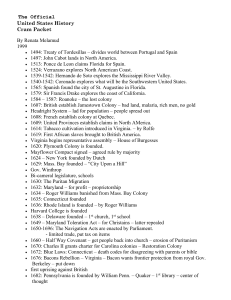Timeline Review (Early Nationalism
advertisement
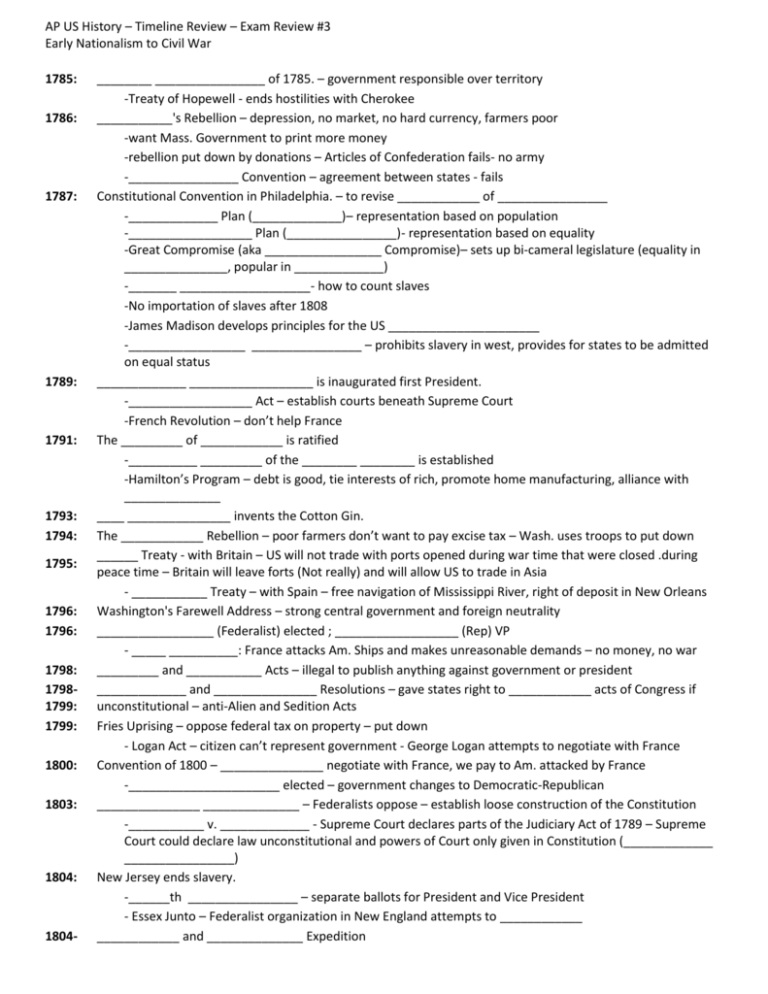
AP US History – Timeline Review – Exam Review #3 Early Nationalism to Civil War 1785: 1786: 1787: 1789: 1791: 1793: 1794: 1795: 1796: 1796: 1798: 17981799: 1799: 1800: 1803: 1804: 1804- ________ ________________ of 1785. – government responsible over territory -Treaty of Hopewell - ends hostilities with Cherokee ___________'s Rebellion – depression, no market, no hard currency, farmers poor -want Mass. Government to print more money -rebellion put down by donations – Articles of Confederation fails- no army -________________ Convention – agreement between states - fails Constitutional Convention in Philadelphia. – to revise ____________ of ________________ -_____________ Plan (_____________)– representation based on population -__________________ Plan (________________)- representation based on equality -Great Compromise (aka _________________ Compromise)– sets up bi-cameral legislature (equality in _______________, popular in _____________) -_______ ___________________- how to count slaves -No importation of slaves after 1808 -James Madison develops principles for the US ______________________ -_________________ ________________ – prohibits slavery in west, provides for states to be admitted on equal status _____________ __________________ is inaugurated first President. -__________________ Act – establish courts beneath Supreme Court -French Revolution – don’t help France The _________ of ____________ is ratified -__________ _________ of the ________ ________ is established -Hamilton’s Program – debt is good, tie interests of rich, promote home manufacturing, alliance with ______________ ____ _______________ invents the Cotton Gin. The ____________ Rebellion – poor farmers don’t want to pay excise tax – Wash. uses troops to put down ______ Treaty - with Britain – US will not trade with ports opened during war time that were closed .during peace time – Britain will leave forts (Not really) and will allow US to trade in Asia - ___________ Treaty – with Spain – free navigation of Mississippi River, right of deposit in New Orleans Washington's Farewell Address – strong central government and foreign neutrality _________________ (Federalist) elected ; __________________ (Rep) VP - _____ __________: France attacks Am. Ships and makes unreasonable demands – no money, no war _________ and ___________ Acts – illegal to publish anything against government or president _____________ and _______________ Resolutions – gave states right to ____________ acts of Congress if unconstitutional – anti-Alien and Sedition Acts Fries Uprising – oppose federal tax on property – put down - Logan Act – citizen can’t represent government - George Logan attempts to negotiate with France Convention of 1800 – _______________ negotiate with France, we pay to Am. attacked by France -______________________ elected – government changes to Democratic-Republican _______________ ______________ – Federalists oppose – establish loose construction of the Constitution -___________ v. _____________ - Supreme Court declares parts of the Judiciary Act of 1789 – Supreme Court could declare law unconstitutional and powers of Court only given in Constitution (_____________ ________________) New Jersey ends slavery. -______th ________________ – separate ballots for President and Vice President - Essex Junto – Federalist organization in New England attempts to ____________ ____________ and ______________ Expedition AP US History – Timeline Review – Exam Review #3 Early Nationalism to Civil War 1806: 1805: 1807: 1808: 1809: 1810: 1811: 18121814: 1814: 1816: 1817: 1818: 1819: 1820: 1822: 1823: 1824: 1825: 1826: 1828: ____________ war ends – defeat of ______________ pirates Robert Fulton builds his first ____________________. - US ship Leopard sunk by Br. for refusal to be searched - ______________ Act – stop exports – no war, no impressment – Federalist object to cut off trade African Slave Trade ends. ______________________ Act – resumes trade with all but France and Britain _______________ v. _______________ - action of state can be declared unconstitutional Charter for Bank of U.S. rejected - Battle of ____________: Harrison defeats Indian Tecumseh who made alliance with Indians for defense The War of 1812 – to protest ____________, stop ____________________, protect ____________________ - War Hawks – want Canada to join - Federalist against war Treaty of _____________ – ends war with a status-quo - Era of ________ ____________ begins - ____________ Convention – Federalists against War of 1812 and mercantile practices of Madison 2nd Bank of U.S. created - 1st protective _____________ - _____________________________ founded – to relocate free blacks to Liberia if desired - Election of _______________ (Rep) vs. King (Fed) - ________ ________’s American System – federally funded domestic improvements and protective tariff Veto of Bonus Bill by Madison – Bonus bill for domestic improvements -Rush- Bagot Disarmament – between US and Br. – to get fishing rights Convention of 1818 – enforcement of fishing rights – N. Louisiana boundary at 49 parallel Transcontinental Treaty - Get Florida from Spain – _____________ invades, remove Spanish threat - Panic of 1817 – land speculation, banks can’t pay loans of Bank of US = bank runs - ______________ vs. _____________ – Enforced constitutionality of 2nd Bank of US and “the power to tax is the power to destroy” - Dartmouth College vs. Woodward- Broad interpretation of contract _____________ _____________ – ___________ admitted as free state and _______________ a slave state but no slavery north Missouri - Land Act – reduce price of land – encourage development Cumberland Road Bill – to build road – Monroe vetoes _____________ ______________ declared – No future colonization of this hemisphere -Treaty with Russia – get everything under 54 parallel Election ____________________________________ (Rep) defeats Andrew Jackson (_______), Clay (_______) -______________ pushed support to Adams -Jackson calls the election a “_______________ _______________” -______________ v. _____________ – interstate trade controlled by fed. courts The _________ Canal is opened. Panama Conference (PAN American) - Congress doesn’t send ambassador to avoid slavery issue Tariff of Abominations – protective – _____________ (region) opposes - South Carolina Exposition and Protest – by _____________ –reaffirms right of state to ___________ a federal law AP US History – Timeline Review – Exam Review #3 Early Nationalism to Civil War 1828: 1829: 1830s: 1830: 1831: 18311838: 1832: 1833: 18351836: 1836: 1837: - Election of 1828: Jackson (Dem). Adams (Rep) promises to limit executive power, internal improvements, lower debt Removes appointees – trusts friends – “kitchen cabinet” – aka ____________ _______________ Maysville Road Bill Veto – only within Kentucky -Webster (nationalist) – Hayne (states rights) Debates – began over Tariff of Abominations The Second __________ ____________________ - religious revival, influences groups throughout states Baltimore and Ohio Railroad begins operation. The _________________ begins publication. – abolitionist become vocal -______ _______________ Rebellion -_________ _______________ invents the reaper The ___________ ___ _________--Cherokee Indians are removed to ________________ Tariff of 1832 – raises tariffs again – _______________ (VP) resigns - _____________ Bill – allows president to do what is necessary to enforce tariff (even send military) - Ordinance of _________________ – South Carolina nullifies tariff –Clay negotiates and reduces tariff -Jackson’s ___________ of the of Bank of U.S. re-charter - Department of Indian affairs established - Seminole War with Indians begins - Cherokee Nation vs. _______________ – Federal government has control, not Georgia - Agreement with Britain to open West Indies ports Roger Taney removes federal funds from Bank of U.S. by order – thinks bank is unconstitutional Texas War for Independence – “_________ __________ Republic” The Gag Rule - Specie Circular – western land must be paid by hard currency - Election of 1836 – Harrison (__________) defeated by _____ _____________ (Democrat) US recognizes the Republic of _____________. -Oberlin College enrolls its first ________________ students. - Charles Bridge vs. Warren Bridge- only strict interpretation of contract - Panic of 1837 – due to Jackson’s withdrawal of funds from Bank of U.S. - ________ ____________ does nothing 1938 – ________________ “War” – bloodless – boundary dispute between Maine and New Brunswick 1839: 1840: Independent Treasury System – constructs vaults to hold federal money -Election of 1840 – _____________ (Whig) defeats Van Buren - Harrison catches pneumonia and dies, VP ________ ___________ becomes president 1841: Independent Treasury Act Repealed -Tyler vetoes re-charter of Bank of U.S. -Preemption Bill – to distribute money from sale of western lands to states – bill defeated 1842: Tariff Bill – raised tariffs back to 1832 status -Dorr Rebellion: Rhode Island – rebellion against land qualifications for voting – Tyler puts down -1839: ___________ – _____________ Treaty – ends boundary dispute 1843: __________________ Trail - migration 1844: Election of 1844 –__________ (Dem) defeats Clay (Whig) and Birney (Liberty – anti-slavery) 1845: Taxes annexation Bill – by Tyler – permits admission of Texas and Florida AP US History – Timeline Review – Exam Review #3 Early Nationalism to Civil War 1846: 18461848: 1847: 1848: 1850: 1852: 1853: 1854: 1856: 1857: -Annexation of Texas Elias Howe invents the sewing machine. Mexican-American War- Gen. __________ ______________ provokes Mexicans by moving into disputed RioGrande / Neuces River -Three part plan to take over Mexico – decide against -Slidell Mission –Slidell sent to negotiate – rejected by Mexico -1846,1847: __________ __________ – no slavery in new states formed from Mexican land – rejected -54” 40’ or Fight – instead, get Oregon below ____th parallel -Reestablish Independent Treasury System – vaults -Walker Tariff Bill – lowered tariff Polk Doctrine – resurrection of Monroe Doctrine concerning admitting new states into union -Obtain Oregon below 49 parallel Trist Mission – Trists negotiates Treaty of _________________-_______________ -Get territory of Arizona, California, Colorado, Nevada, New Mexico, Utah, and Wyoming -Gold is discovered at ______________’s Mill in California. -Women's Rights Convention is held in ____________ _________, NY – headed by Mott and Stanton -Election of 1848 – _________ ____________ (Whig) defeats Cass (Dem. – father of pop. sovereignty) and Van Buren (Free-Soil – abolitionists) – Taylor dies (1850) – _________ ____________ VP, becomes president Clay’s ___________________ of _________ – passes as separate acts during Fillmore – but violated -______________ enters as a free state -Other areas – popular sovereignty -US takes Texas debts -Slave trade banned in ________________________ -Fugitive Slave Law strengthened -Clayton – Bulwer Treaty – U.S. and Britain agree to neutrality of a canal in Central America Commodore _______________ ____________ opens Japan to US trade. -Election of 1852: _____________ (Dem) defeats Scott (Whig) ____________________ Purchase – buy land from Mexico to build RR -Uncle Tom’s Cabin - ________________________ The ______________-________________ Act - passed to create two states for a RR to go to west – slavery in states determined by _________________ ___________________ – North fears overturn of ______________ ______________________ -New England Emigrant Aid Society – into Kansas / Nebraska territory -1854-1859 – __________ ___________ – Topeka (Free Soilers) government vs. LeCompton (slavery) -______________ ______________ – possible purchase of Cuba – rejected -Walker expedition – Walker raises army, takes Nicaragua, Pierce recognizes new government Lawrence Mob Violency: abolitionist materials burned -Pottawatomie Massacre: _________ ___________ kills four pro-slavery people -Election of 1856: _____________ (Dem) defeats Fremont (Rep –Free Soil) and Fillmore (Know Nothings) The _________ __________ decision. -slaves are ____________________ to be taken anywhere – allows for slavery in North -________________ ________________ unconstitutional -LeCompton Constitution rejected -Panic of 1857 – depression – Buchanan does nothing AP US History – Timeline Review – Exam Review #3 Early Nationalism to Civil War 1858: 1859: 1860: 1860: 18601865: 1860: 1861: 1861: 1862: 1863: 1864: 1865: ____________ – ______________ Debates – on extension of ______________ into new territories -Free Port Doctrine – Dred Scott decision has to be enforced – if not popular sovereignty rules -“___ _________ _________” against itself can’t stand – Lincoln’s speech John Brown’s Raid – _____________ __________, _____ - to free slaves Crittenden Compromise – last attempt at amendment against barring slavery below 36’ 30 line - fails Election of 1860 – ___________________ (_________) defeats Douglas (Dem) - Lincoln not an _______________________ The _________ War ________ ____________ secedes. -Beginning of Industrial Revolution – “_____________ Age” The Civil War begins at ________ ____________ – Beauregard (S)fires first shot -Lincoln implements first _________________ -“Necessity Knows no Law” – Lincoln increases army, navy, 1st ___________ tax, green backs, no freedom of press or speech, Villandigham (Copperhead – Peace Dem) jailed -___________ ___________ of ______________ established – _______ (President); Stephens - VP Kansas admitted as a free state -Ex Parte Marryman – Lincoln suspends ____________ ___________ and passes martial law in Maryland – Taney says only Congress can suspend habeas corpus -1st battle: _________ __________ – ___________ wins – Civil War becomes long Pacific RR Act – partially fed. funded – gave land for RR -_______________ Act – 1862 – gov. land grants for agricultural college Battle at ________________ - stalemate -Siege of ____________________; Grant wins, Confederacy cut in half (at _________________ River) -Banking Acts (1863, 1864) – establish federally charted banks -____________ Riot - NY -The _____________________ _____________________ - announces freedom of slaves in the ___________, not in ____________ states (slave states in Union) -Battle of ______________________ – turning point (1st major victory for the ________________) -Lincoln announces "___ ____________ Plan." – lenient plan –must plan allegiance to US Election of 1864 – _______________ (Rep) defeats his former gen, _____________ (Dem) -Wade – Davis Bill: South divided into military units until majority pledges allegiance and bans slavery -Wade - Davis Manifesto: Congress controls Reconstruction -Pullman Car and Refrigerated Car invented -_________ _____________ Massacre – Chivington attacks defenseless Indian village Civil War Ends – ________ surrenders to ___________ at _______________________, VA -1865: __________________’s Bureau is established – education and food -__________________ is assassinated – __________ __________________ becomes president -Johnson’s amnesty plan – __________________ almost all Confederates -_____________________ Amendment – abolishes slavery
